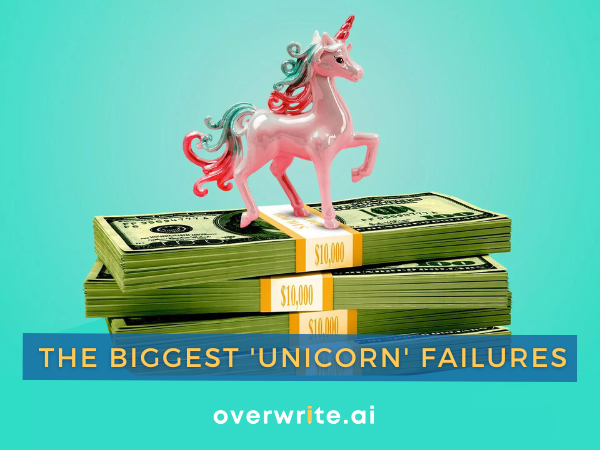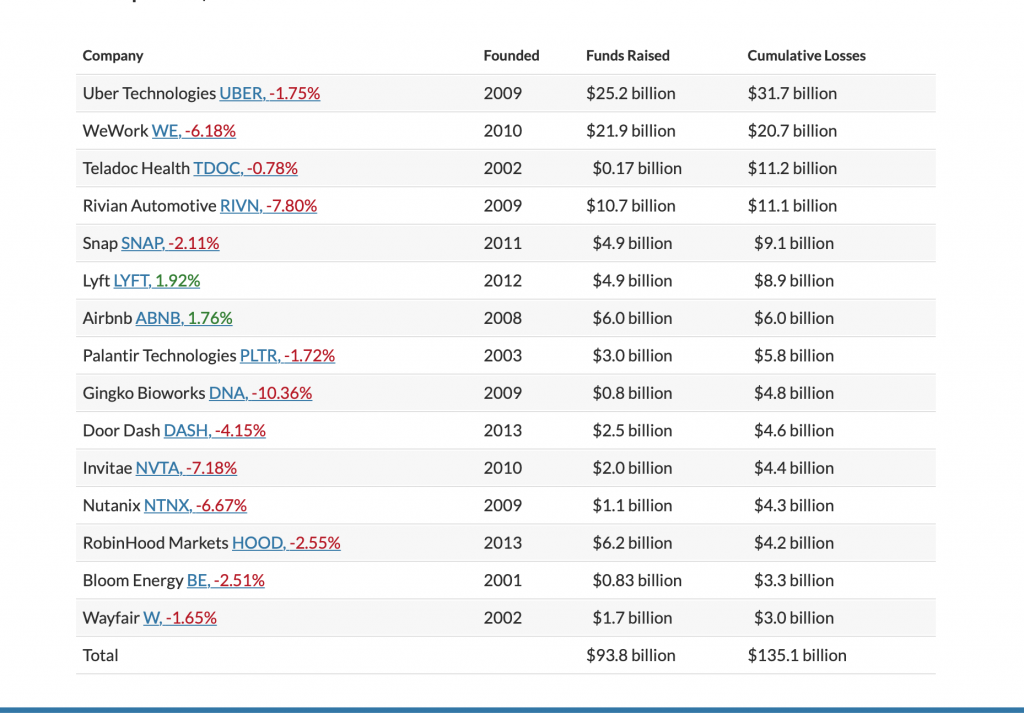
Investors have rained cash on Uber, Airbnb and other unprofitable companies.
Any one of these 15 money-losing companies could become the stock market’s biggest ‘unicorn’ failure ever.
David Rush holds a Guinness world record for cramming 100 candles into his mouth and lighting them.
Sandeep Singh Kaila spun a basketball on a toothbrush for a record 1 minute and 8.15 seconds. Neville Sharp emitted a 112.4 decibel burp.
If those zany stunts can make it into the Guinness Book of World Records, there should be a category for something really important — the world’s biggest startup company failure.
There is certainly no shortage of contenders for this dubious honor.
Before 2015, the biggest bankruptcies (by funding) were Solyndra ($1.2 billion), Abound Solar ($614 million), and Better Place ($675 million).
WebVan got a lot of publicity when it received $275 million in venture capital funding and failed in 2001 after three years of operation. More recently, Theranos received $500 million in venture capital funding and was a well-publicized disaster, with CEO Elizabeth Holmes and president Ramesh “Sunny” Balwani both convicted of multiple counts of fraud.
Those failures are large, but the cumulative losses of many startups that have not yet gone bankrupt are orders of magnitude larger.
The table below shows the funds raised by the 15 biggest money-losing startups in the U.S. Cumulatively they raised $93.8 billion in startup funds and have lost $135.1 billion.

Only one of these 15 companies has ever had a profitable quarter — Airbnb had a $378 million profit on $2.1 billion in revenue in the second quarter of 2022.
All of the other startups in the table have recent losses that exceed 10% of revenue and most exceed 30%.
Any hopeful arguments that profitability is just around the corner ring hollow when every company is at least nine years old and two are more than 20 years old.
At some point, investors will say, “Enough is enough” and realize that it is a sunk-cost fallacy to throw good money after bad.
Eleven of the 15 companies in the table have raised more money than was raised by any bankrupt startup.
The two biggest losers so far are Uber and WeWork.
So far, Uber has cumulative losses of $31.7 billion and WeWork $20.7 billion, with no end in sight. Uber’s stock price is down about 35% from its 52-week high. WeWork is down 71% and is now officially a penny stock.
Losses have to be financed and it is increasingly difficult for these companies to do so.
Uber has cumulative losses of $31.7 billion and WeWork $20.7 billion. Most of these so-called unicorn startups have seen their share prices fall more than 50% in the past year, and many of these stocks are down more than 90%.
Most of these so-called unicorn startups have seen their share prices fall more than 50% in the past year, and many of these stocks are down more than 90%. WeWork isn’t the only unicorn turning into a penny stock.
These stock-price declines will make it increasingly difficult and expensive to issue more stock in order to raise funds to cover ongoing losses. Meanwhile, rising interest rates are increasing the cost of servicing existing debt and making it difficult and expensive to issue even more debt.
Many unicorns will surely soon go bankrupt or be acquired at fire-sale prices. A failure of Uber or WeWork would be 10 times larger than the previous records for lost venture-capital funding.
A wave of unicorn failures would send tremors through financial markets, but it is unlikely that the federal government would use a “too-big-too-fail” excuse to intervene.
Although the startups in the table are U.S. companies, unicorn startups in other countries have similar problems: European startups (Delivery Hero DHER, -0.90%, Deliveroo ROO, –2.44%, and Wise WISE, -0.78% ); Chinese ones (Didi DIDIY, -5.50%, Kuaishou 1024, -3.44%, Billi Billi , and Pinduoduo PDD, -2.60% ); Indian ones (Ola , Paytm , and Zomato 543320, -1.29% ), and Singaporean ones (Grab and SEA ) also have multi-billion dollar cumulative losses.
New records among unicorn companies will likely soon be set all over the world — but they won’t be as benign as records for candle stuffing, basketball spinning, and burping.
This column does not necessarily reflect the opinion of overwrite.ai and its owners.
Jeffrey Lee Funk and Gary Smith writes for Market Watch.
This story has been published from an article on 14th September 2022, without modifications to the text. Only the headline has been changed.
For informative and light-hearted news and views on the world of real estate, follow overwrite.ai on Instagram and LinkedIn, and keep up-to-date with our weekly NewsBites blog.
overwrite.ai | the AI writing assistant for real estate | Sign up for your Free 7 Day Trial.
For Full Article: https://www.marketwatch.com/story/investors-have-rained-money-on-unprofitable-companies-one-with-32-billion-in-losses-now-any-of-these-15-stocks-could-become-the-biggest-unicorn-failure-ever-11663146770